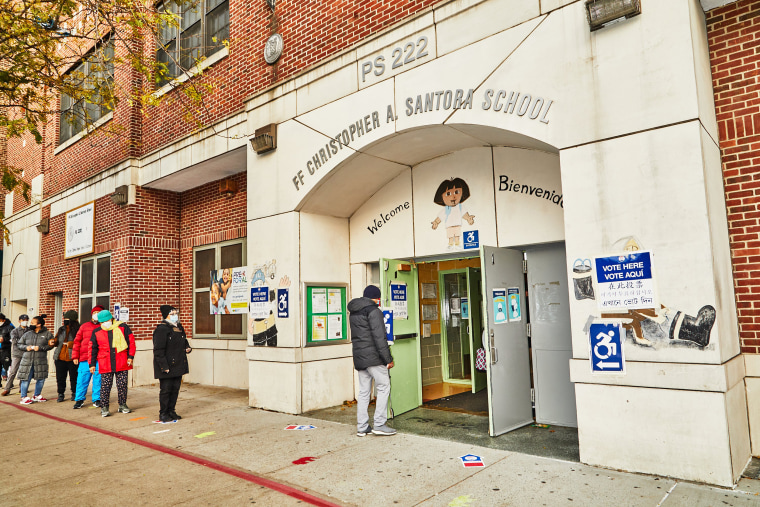If you had said to me in June that nearly 100 million people would vote before Election Day, that the total projected turnout would surpass a record 150 million and that Election Day itself would go off without a significant hitch, I wouldn’t have believed you.
However, this is exactly what happened. Despite the Covid-19 pandemic, partisan warfare over election rules, capricious court interventions and President Donald Trump’s constant disinformation, the American voters and election officials essentially overcame the year’s chaos with heroic persistence, determination and hard work.
Of course, the election rules and laws matter a lot — it’s just that, fortunately, people sometimes matter even more.
But this election also revealed serious vulnerabilities in American democracy that aren’t going away unless we do something now. Intense hyperpartisanship, significant underinvestment in election administration, ambiguous election rules and growing public distrust of the election process could have easily made a disaster of this election.
Still, even with post-election litigation perhaps to come, we shouldn’t forget how close we came to a larger election meltdown this year.
Next time, we might not be so lucky; none of these problems will go away soon. Whether it’s the next election or later on, we’ll eventually confront a disastrous election where voters will struggle to cast their ballots and suspect fraud or misconduct around every corner, the margins too close to call, while the parties melt down the system in endless, self-destructive warfare over election rules and challenges as the system collapses. We have to affirmatively address all of these underlying issues.
After an uneventful election passes, we instantly lull ourselves back into a false sense of comfort.
This year, the Covid-19 pandemic obviously complicated in-person voting and precipitated a necessary and abrupt shift to mail-in and early voting. The sudden shift was such a staggering success in both overcoming both the pandemic’s potential to reduce voter participation and easing existing burdens to access that expanded mail-in and early voting will assuredly stay with us beyond this election.
Ironically, the pandemic might also have helped make this election more of a success because it focused our attention on the election process well in advance of Election Day. As early as April — during the chaotic primary season — voters and election administrators began thinking hard about how to vote and better run the fall’s election. The urgency of the national health crisis spurred private donations, motivated young people to volunteer as poll workers and focused the country on how the election needed to be run.
The administration of our elections rarely gets the attention and resources it deserves because, after an uneventful election passes, we instantly lull ourselves back into a false sense of comfort. Elections are exceptionally important, but the details of their administration are boring, so we tend to worry about them only once every two or four years.
We should instead think ahead now, before our attention fades again, about investing in our election system to make it durable and resilient, because the next election probably won’t benefit from the same sense of urgency as this one. We have to modernize voter registration procedures and put them all online, make permanent the expansion of mail-in and early voting and invest in the necessary infrastructure for these tasks.
The pandemic will — one hopes — ease before the next election, but hyperpartisanship between Democrats and Republicans will not; rather, it is likely the permanent state of modern American politics. This year, it played out in all-out war over election rules, all the way through Election Day. and may yet result in more battles over recounts and in post-election contests. Republicans accused Democrats of voter fraud, while Democrats fired back with accusations of voter suppression. And without question, the Republican Party engaged in what veteran GOP election lawyer Ben Ginsberg, in a Texas case, called a “shameful effort” to disenfranchise voters in a disingenuous campaign against illusory election fraud. Trump’s constant disinformation about fraud intensified the campaign, but he didn’t start it, nor will it go away if his presidency comes to a close.
However, it helps tremendously when prominent Republicans like Ginsberg and Michael Mukasey speak out and try to help draw down the so-called voting war between Democrats and Republicans. When the parties fight so fiercely over election rules, the interests of regular voters get lost in the competition for partisan advantage. Both parties should instead unite in the wake of these elections to make voting easier for all eligible voters and hopefully, in the process, reduce partisan recriminations that so badly erode people’s trust in the system. Simplifying voter registration, clarifying emergency election rules and procedures, reducing wait times for in-person voting and fighting foreign interference in American elections are efforts that both parties can join together to support.
We dodged a meltdown of our systems in this election because the pandemic created an early sense of urgency and motivated enormous efforts to make the election a success, despite profound challenges. But unless we think affirmatively about what we need to do next time, we’re unlikely to be so lucky again.



